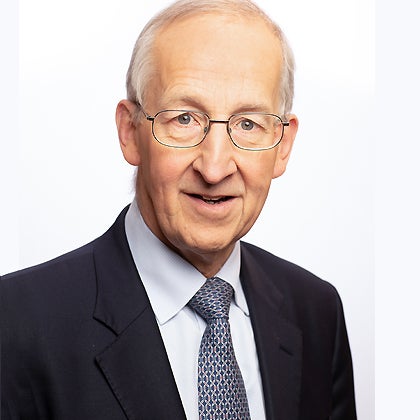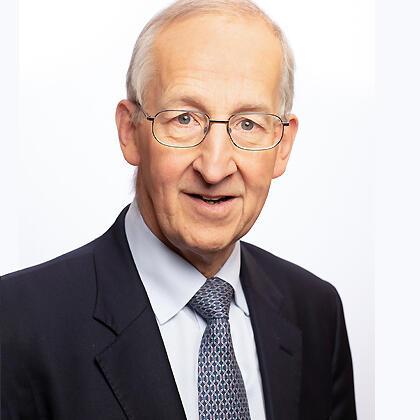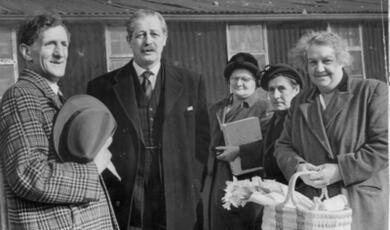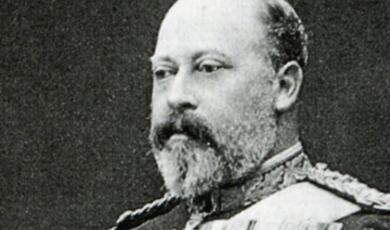Britain's Foreign Policy in a Fast-Changing World
Share
- Details
- Text
- Audio
- Downloads
- Extra Reading
The 2022 Peter Nailor Memorial Lecture
For 40 years Britain's national strategy rested on two main pillars: close partnership with the United States, and a leading role in Europe. Both remain important, but the dramatic shifts in global geopolitics of recent years must make us re-appraise Britain's diplomatic priorities. How has Russia's aggression in Ukraine changed the focus of our foreign policy? How can the UK- outside the EU- best exercise influence to protect its interests and promote its values in a fast-changing world?
Download Text
Britain’s foreign policy in a fast-changing world
Lord Peter Ricketts GCMG, GCVO
18 October 2022
The international situation is more dangerous and more unpredictable than at any time in my 40 years as a diplomat – and perhaps at any time since the end of World War II. My aim in this lecture will be to give you a diagnosis of this turbulent global landscape, and to end with some thoughts as to what Britain’s foreign policy priorities should be. Public debate on these issues has never been more important, and I therefore particularly look forward to your questions and comments.
Analysis is made more difficult because we are seeing a combination of some very significant long-term shifts in the tectonic plates and some violent short-term upheavals.
The long-term trends will be familiar to you but let me sketch them in briefly.
The international rules-based system as set out in the UN Charter of 1945 is under unprecedented strain. This is partly because the US and its allies have been in retreat from the leadership role they played in underpinning the system. That retreat began as a response to the disastrous failure of the intervention in Iraq in 2003. Together with the long and unsuccessful operation in Afghanistan, this undermined public confidence in the competence of those making foreign policy, and also damaged our authority as upholders of the international rules. The 2008 financial crisis further tarnished the brand of Western liberal democracy in the world, and exacerbated inequalities in many Western countries including the UK. In my view, the current wave of populism sweeping through our politics has its roots in this combination of factors.
Chinese and Russian leaders were quick to move into the gap left by the West’s retreat from leadership. Xi Jinping has been emboldened by China’s emergence as the world’s second economic power to tear up the previous policy of cautious cooperation with the West. Now, China is flexing its muscles far more openly in pursuing political and military dominance in Asia and seeking control over much of the world’s next-generation technology. Russia under Putin is a disruptive power, compensating for economic decline with a revanchist foreign policy. With hindsight, the West responded far too mildly to Putin’s invasion of Georgia in 2008 and his annexation of Crimea in 2014. Now he has made an even more desperate gamble. I will come back to his war in Ukraine.
To complete this overview of the longer-term trends, we are dealing not only with a shift of economic power away from the US and its allies towards Asia, but the emergence of authoritarian leaders in many countries who reject any notion of universally binding rules and values such as human rights and the rule of law. Think of Erdogan in Turkey and Bolsonaro in Brazil. We have a fracturing of the global trading system and the prospect of the same thing happening to the financial system. The West has woken up belatedly to the fact that China offers a model which many rulers around the world find attractive, showing that democratic freedoms are not necessary for economic prosperity.
Overlaying these longer-term trends are the series of upheavals which have come thick and fast in recent years.
For the UK, Brexit has been a massive dislocation. The cost of throwing up barriers to trade and other exchanges with our closest neighbours was initially masked by the pandemic but becomes more apparent all the time. Economists may differ on exactly how large the hit will be to Britain’s GDP over time, but it is substantial, and it is one of the factors underlying the fact that our country currently has the highest inflation and lowest growth among the major developed nations.
The chaotic handling of Brexit, including the threats to break international law over the Northern Ireland protocol, have done real damage to Britain’s reputation as a serious and trustworthy international partner. Such reputations are established over the longer term but can be lost very quickly.
The Covid pandemic exacerbated for many countries the trends I have been discussing, in particular the contraction of global trade and the deteriorating relationship with China.
On top of all this, we now have the largest and most dangerous war in Europe since 1945.
Taken together, that is a daunting agenda for the new British government, as it tries to recover from the financial crisis it precipitated in its first weeks in office and starts to rewrite once again the country’s national security strategy.
Before coming to my prescription for how Britain can go about rebuilding its reputation and powers of influence in the world, I would like to spend a little time on the implications for European security of the Ukraine war. I do this mainly because it is my area of expertise, having served in NATO both during the Cold War in the late 1970s and then again as Ambassador from 2003. I have often found when lecturing about these issues that NATO is a rather unknown quantity. Not surprisingly, since it has not been at the centre of our security since the end of the Cold War.
Why has NATO proved to be such a durable part of the post-war security architecture? The short answer is that it is a unique blend two ingredients. First, a collective defence organisation. Second, a political alliance committed to promoting democracy human rights and the rule of law. These two aspects reinforce each other. A NATO member state can be confident that other members will come to its defence if attacked, not just because of words written in a Treaty but because of the strength of shared political commitment among the member states to support each other.
The cement that holds NATO together is confidence. The Washington Treaty which set up NATO in 1949 is not a legally binding text. There is no transfer of sovereignty. It is based on the most solemn political commitment but preserves maximum discretion for member states on how they implement that commitment. The famous article 5 in the NATO treaty finds an elusive point of balance between these two elements. It was the hardest-fought part of the negotiations before the Treaty was signed. The American Senate insisted that there could be no automatic commitment to the US going to war to defend a NATO ally. The Europeans, led by the British Foreign Secretary Ernest Bevin, were determined to make it clear as possible that an armed attack would be met with a military response. That is why article 5 commits each member states to take
‘such action as it deems necessary, including the use of armed force, to restore and maintain the security of the North Atlantic area’.
To repeat, NATO deterrence rests on the credibility of that central undertaking, and in particular the US commitment to come to the aid of its European allies with the full weight of its military power (including of course its massive nuclear arsenal in the background) if any were attacked.
NATO has always been an unequal alliance. The US has been from the start massively stronger militarily and economically than all the other allies. The unbalanced shape and NATO could have been a real problem. But in fact it has always been a mutual dependence. The European allies have certainly needed the Americans to provide deterrence of the Soviet Union and, later, Russia. US administrations understood from the start of the Cold War that they too needed European allies if they were to successfully confront the Soviet threat in all its forms. That mutual dependence continued once the Cold War is over. The Europeans needed American intervention to put an end to ethnic cleansing in the Balkans. The US needed support from its European allies, for example with their intervention in Afghanistan after the 9/11 attacks.
The open questioning by Donald Trump of NATO’s value was so toxic because it undermined trust in the strength of US commitment. Fortunately, President Biden understands the importance of the credibility of the US guarantee. Just as well, since for the first time in 80 years, we have large-scale conventional warfare in Europe, with cities being smashed to pieces by artillery fire reminiscent of the worst moments in the 20th century. NATO is back to its initial purpose of deterring and defending against threats to the national territory of its member states. Fortunately, the NATO military structure never lost its focus on this core task. The plans are in place for the defence of NATO Europe, and the organisation has responded very professionally, with the major reinforcement of US forces in Europe and the forward deployment of significantly stronger forces by many allies including Britain.
Putin was often seen in European capitals is a master strategist, unrolling step-by-step a long-term plan to rebuild Russia’s position as a great power and the major force in European security. But his war in Ukraine has not only failed to achieve its military objectives and undermined the reputation of Russia’s armed forces. It has left NATO stronger and more purposeful than I have known it since the Cold War. And it has transformed the security situation in northern Europe with the profoundly important decisions by Finland and Sweden to join NATO .
Putin’s reckless nuclear threats are in my judgement primarily intended to frighten Western public opinion into reducing our support for Ukraine, specifically weapons deliveries. He surely knows that any use of nuclear weapons would be catastrophic for Russia. For one thing, it would be the end of his partnership with China, leaving Russia a pariah indeed. However, NATO governments are quite right to plan for every contingency. I am confident in the strength of NATO to deter any attack on a member of the Alliance. Putin has enough on his hands with the shockingly poor performance of Russian forces in Ukraine.
In the immediate future, the prospect is that the intensity of fighting will reduce as the winter comes on. Russian troops are demoralised and have suffered huge losses. They will need to pause and resupply. Effective Western sanctions will make it more difficult for Moscow to rebuild stocks of the more sophisticated weapons. I believe that the timing of the annexation of the Donbass region was driven by the desperate need to present the Russian people something that looked like a success before the winter, although that announcement was soon overshadowed by the humiliation for Putin of the sabotaging of the Kursk bridge.
I am expecting stagnation along a fragile line of separation over the winter, with fighting resuming in the Spring. The US, Britain, the EU will all need to use this period to bolster Ukraine’s military capacity and its economy to put it in as strong a position as possible for the new fighting season.
There is a real risk of Ukraine fatigue as economic pressures mount across Europe. I am confident that the UK and US will stay the course in supporting Kyiv. But I expect the debate to gather force around Europe during the winter over how long to continue the current unconditional support for Ukraine. The EU’s response in the early months of the conflict was very impressive. I was surprised by the speed and strength of EU sanctions on Russia and the decision to fund arms deliveries from the EU budget. But implementation of both economic and military support has been slower than it should have been. And now, fractures are now beginning to appear in the united EU approach, as member states face up the painful measures to wean themselves off dependence on Russian oil and especially gas. If it can be achieved, the decoupling of Europe from dependence on Russian energy would be a strategic shift in the balance of power in Europe, sharply reducing Moscow’s leverage.
The war in Ukraine poses some serious questions for the EU, about its role in the world and how far it goes in the direction of becoming a serious defence power. In Germany, the historic decision by Chancellor Scholz to lead Germany towards a more active security role and higher defence spending seems to have strong public backing. But the extra spending will take several years to translate into real military capability. And, beyond the military hardware, a far-reaching cultural shift is needed if Germany is to take its full role on defence and security matching its economic weight.
The debates over Ukraine, Russia and European security both in the EU and NATO will be heavily influenced by the outcome of the 2024 US election. If Trump or a Trump-like figure wins, then the case for moving quickly to real European autonomy will be hugely strengthened. But a different Republican candidate might not take Trump’s view of NATO. Republican as well as Democrat backing for NATO in Congress is very strong. In any case, uncertainty about 2024 will cast an increasing shadow over the debate across Europe on these issues.
I will mention one other uncertainty for national security policymakers. That is China. Although Russia is the most immediate threat to international security, China is the greater long-term risk. While Russia is a declining power, China is vying with the US for economic dominance and has been investing massively in its military forces. I was glad to see that NATO at the Madrid summit in June put China squarely on the alliance’s agenda. This does not mean that NATO should take on a military role in East Asia. But the Chinese bid to dominate technologies, their theft of intellectual property and cyber capabilities are all worrying. And they are an increasing military presence in the North Atlantic area. The US and its allies have lacked a forum to coordinate policies on China, for example to ensure that we never again find ourselves in a situation where China is the dominant supplier of critical technology, as was the case with Huawei and 5G telecoms equipment. NATO might be able to coordinate consultations in this field, especially since Asian allies such as Australia and Japan are longstanding partners of NATO.
I have ranged widely over the international situation, although I have not tried to cover every threat and risk in our troubled world. Let me now draw three brief conclusions for British foreign policy. In doing so, I am drawing on a longer analysis you will find in my book ‘Hard Choices: the making and unmaking of Global Britain’.
First, major war puts all other issues into perspective. It is time for Britain to lay aside the exceptionalism and hubris which have exemplified our foreign policy since the Brexit decision. Despite the rhetoric, Britain is no longer a world-leading power. If our country is to have influence, it has to be by working effectively with friends and allies to reinforce the international rules-based order on which we depend so much. The UK response to the Ukraine crisis has been impressive, a reminder that we can still show international leadership when we have a sound analysis, compelling policy ideas and consistent focus from political leaders. But despite the effective response from NATO and the EU, there is a strong message in the fact that over a hundred countries have refused to have anything to do with sanctions against Russia.. Part of the problem is that British politicians have been so consumed by Brexit for the last six years that there has been very little active British diplomacy in many parts of the world. When British Ministers come asking for help over Ukraine, others are inclined to ask: what have you done on the problems that matter to us? Britain needs to show on a wider range of foreign policy issues that it is once again an initiative-taking problem-solving power. That will be a better basis for a discussion with countries like India, South Africa and Brazil on the theme that the rules-based order is worth preserving in their own interests.
Second, China. I do not believe that a Chinese attack on Taiwan is imminent. I am sure China was surprised by the strength of the Western reaction to Ukraine. But I also doubt that we can get through the next 10-15 years without a major crisis over Taiwan. The US carries the major responsibility for upholding international law in the Indo-Pacific area. But Britain, with its diplomatic, intelligence and military capabilities, should be making a contribution to what remains our closest ally’s number one national security priority. The Integrated Review of UK foreign and defence policy published in 2021 made much play with an ‘Indo-Pacific tilt’. I was concerned at the time that this was more a slogan than a strategy. In fact little was done to give it effect beyond a visit to the region by our new aircraft carrier. Now the Ukraine war has shown that the core of British national security lies in Europe. But the government needs to frame a China strategy for the longer term. This should include a close partnership with the US on all aspects of Chinese policy which could affect our security. But, given the dire state of the British economy, we also need to maintain a functioning commercial relationship with China, which will continue to be one of the main sources of growth in the world economy.
My third conclusion and most profound hope is that the current British Government will use the Ukraine crisis to rebuild a mature working relationship with the EU in foreign and security policy across the board. There has been useful discreet coordination between London and Brussels over sanctions on Russia. It was excellent that the Prime Minister attended the first meeting of the European Political Community in Prague on 6 October, a gathering of 44 nations outside the EU framework to discuss security issues affecting the whole continent. But the government still need to overcome their ideological problem in accepting that the EU is capable of doing anything worthwhile. A more constructive UK-EU relationship is also essential if we are to reset the badly broken relationship with individual European neighbours, particularly France. It is encouraging that the Prime Minister and President Macron agreed in principle on a UK-French summit in 2023. But there will be no summit, and no rapprochement with the EU, if the government insists on pushing through the Northern Ireland Protocol Bill, with its provisions enabling ministers to break our international law commitments.
Major crises can create opportunities. Putin’s massive strategic error in invading Ukraine is leading to a permanent reduction in Russia’s leverage over other European nations, and a strengthening of the Atlantic Alliance. It should also be the moment to rethink Britain’s national strategy. We urgently need to begin the rebuild our reputation, showing by our actions that we are a country that can be trusted to keep its word. Britain should be once again an active participant in tackling the world’s problems on the basis of effective cooperation both with the US and the EU. This crisis can, with statesmanship, lead to a more stable European security order once the horrors of the war have faded.
© Lord Ricketts 2022
References and Further Reading
King’s College London. “The Integrated Review in Context: a study fit for the 2020s?” July 2021 https://www.kcl.ac.uk/the-integrated-review-in-context and “The Integrated Review One Year On” June 2022 https://www.kcl.ac.uk/the-uk-integrated-review-one-year-on
Ricketts, Peter. “Hard Choices: the making and unmaking of global Britain”. Atlantic Books 2022.
References and Further Reading
King’s College London. “The Integrated Review in Context: a study fit for the 2020s?” July 2021 https://www.kcl.ac.uk/the-integrated-review-in-context and “The Integrated Review One Year On” June 2022 https://www.kcl.ac.uk/the-uk-integrated-review-one-year-on
Ricketts, Peter. “Hard Choices: the making and unmaking of global Britain”. Atlantic Books 2022.
This event was on Tue, 18 Oct 2022
Support Gresham
Gresham College has offered an outstanding education to the public free of charge for over 400 years. Today, Gresham College plays an important role in fostering a love of learning and a greater understanding of ourselves and the world around us. Your donation will help to widen our reach and to broaden our audience, allowing more people to benefit from a high-quality education from some of the brightest minds.


 Login
Login






